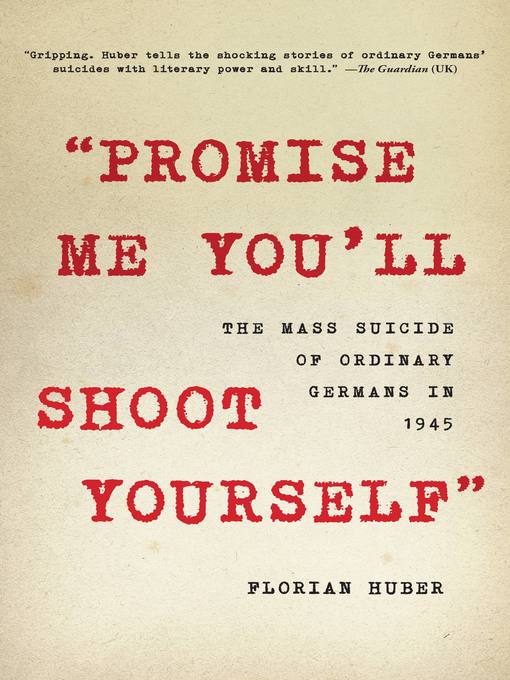
"Promise Me You'll Shoot Yourself"
The Mass Suicide of Ordinary Germans in 1945
کتاب های مرتبط
- اطلاعات
- نقد و بررسی
- دیدگاه کاربران
نقد و بررسی

January 27, 2020
German historian Huber makes his English-language debut with a vivid and disturbing account of the “suicide epidemic” that swept across Germany in the final months of WWII. Drawing on war diaries, published memoirs, letters, and cemetery records, Huber first relates the events of April 30 to May 3, 1945 in Demmin, where advancing Soviet troops—stalled by the German Army’s destruction of the town’s bridges—looted homes, burned buildings, and committed mass rapes, setting off “an unprecedented wave of suicides” (estimates run from 500 to more than 1,000 deaths in the town). Huber describes mothers drowning their children in the Peene River, a schoolteacher shooting his entire family before firing on the Soviets and then killing himself, and three generations of family members who hanged themselves. From Demmin, Huber moves across Germany, exploring how the “tumultuous emotions” unleashed by Hitler’s rise, combined with anti-Soviet propaganda, “the loss of a sense of purpose” as defeat loomed, and a yearslong “devaluation of human life,” led to tens of thousands of suicides. Though the topic is relentlessly grim, Huber portrays his subjects with empathy and offers key insights into the German mindset before, during, and after WWII. Readers will be convinced that reckoning with the war’s legacy requires studying this underexamined tragedy.

February 1, 2020
A sobering study of the collapse of the Third Reich and the wave of suicides that accompanied its fall. Hitler famously shot himself rather than fall into the hands of the Red Army, and many of his closest associates--e.g., Joseph Goebbels and his entire family--followed suit. So, too, writes German historian and documentary filmmaker Huber, did countless "ordinary" Germans, whether out of simple despair or certainty that the crimes of the Nazi regime would be laid at their door. The wave of suicide began earlier than 1945; the author quotes a schoolteacher who wrote after the German defeat at Stalingrad in 1943, "the first and last cause of my despair is the hopelessness of victory." Still, beginning in the spring of 1945, as Huber grimly documents, "large quantities of cyanide and prussic acid were circulating in Germany, in response to an explosion in demand." The Nazi regime began to suppress the statistics related to suicide lest they prompt even more destruction. Drawing on existing records, Huber reckons that in Berlin alone, the suicide rate was five times higher than "normal" in April 1945, when the city fell. The victorious Allies were surprised to find among civilian survivors a kind of orderliness and calm--though, as the author notes, many soldiers who had lived through combat were more inclined to withdraw into themselves, none quite "ready for reality." The subtitle of the book is a touch too narrow. The author not only covers suicides, but also those who defiantly refused either to kill themselves or to acknowledge any wrongdoing, such as a Nazi official who disputed the right of a German court to judge her actions in wartime, seeing them "as henchmen of the occupying powers, accusing her not of any crime, but of fighting for a political ideal." Such repudiation joined with a widespread sense of victimhood that "freed the Germans from the need to examine their own consciences." An illuminating examination of a little-known aspect of World War II.
COPYRIGHT(2020) Kirkus Reviews, ALL RIGHTS RESERVED.

























دیدگاه کاربران